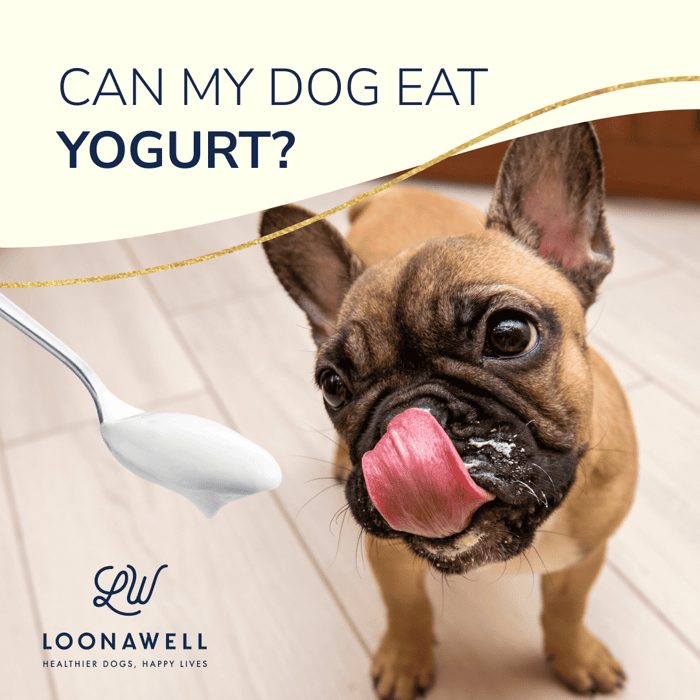As a pet owner, it's natural to want to share your favorite foods with your furry friend. Yogurt, with its creamy texture and freshness, is a popular choice among humans. But if we ask ourselves, can my dog eat yogurt? The answer is ...it depends.
Let's delve into the world of canine nutrition and explore whether yogurt can be a safe and healthy treat for your four-legged companion.
The Nutritional Value of Yogurt for Dogs
Yogurt is a dairy product known for its probiotic content that provides numerous benefits for humans. Probiotics are live bacteria and yeasts that promote gut health, aid digestion, and strengthen the immune system. These benefits have been scientifically proven in humans and extend to dogs as well.
However, not all yogurts are created equal, and certain factors need to be taken into account before sharing this treat with your canine friend.
1. Lactose Intolerance in Dogs:
One crucial consideration when feeding yogurt to your dog is their ability to digest lactose, a sugar present in milk and dairy products. Many dogs (my first westie included!) are lactose intolerant, meaning their bodies lack the enzyme required to break down lactose. This can lead to digestive upset, including diarrhea and stomach discomfort. Therefore it is essential to monitor your dog for any signs of lactose intolerance after introducing them to yogurt the first time.
2. Choose Plain, Unflavored Yogurt, Kefir, or Greek Yogurt:
When considering giving yogurt to your dog, opt for plain, unflavored yogurt with no added sugars or artificial sweeteners (especially xylitol which can be highly toxic for dogs). Flavored yogurts often contain high levels of sugar, artificial flavors and other additives that can be harmful to dogs, so read the label carefully and go for the simplest, natural yogurt (preferably organic).
Great alternatives to yogurt are kefir (contains up to 5x less lactose than yogurts) and greek yogurt (also with a bit less lactose than yogurts although not that big of a difference). Both are also good for a healthy gut and with an interesting texture that your pup will love. Keep the natural, unsweetened rule in mind though.
3. Check for Live Active Cultures:
The beneficial bacteria found in yogurt are live active cultures. These cultures aid in digestion, regulate the gut flora, and support the immune system. When buying yogurt for your dog, make sure it contains live active cultures and probiotics.
4. Portion Control:
While yogurt can be a healthy treat for dogs, it should only be given in moderation (like any other treat). Too much yogurt can lead to excessive calorie intake and contribute to weight gain. As a general guideline, small dogs can have about a teaspoon of yogurt a day, while larger breeds can have a tablespoon. Remember that treats should only constitute a small portion of your dog's overall diet.
Benefits of Yogurt for Dogs:
When introduced responsibly and in appropriate amounts, yogurt can offer several potential benefits for your dog:
a. Improved Digestion: The probiotics in yogurt can help regulate your dog's gut flora, promoting healthy digestion and potentially alleviating issues like diarrhea and constipation.
b. Enhanced Immune System: The beneficial bacteria in yogurt contribute to a stronger immune system, helping your dog's body fight off infections and illnesses.
c. Protein and Calcium Source: Yogurt contains protein and calcium, both of which are essential for your dog's overall health, including muscle and bone maintenance.
d. Treat for Picky Eaters: Mixing a small amount of yogurt with your dog's regular food can entice picky eaters to consume their meals more enthusiastically.
e. Cooling Treat: During hot weather, you can freeze small portions of yogurt to create a refreshing and nutritious frozen treat for your dog.
So, can my dog eat yogurt? If your dog is not lactose intolerant, then yes, your dog can enjoy yogurt as a tasty and potentially beneficial treat. When choosing yogurt for your furry friend, prioritize plain, organic, unflavored options with live active cultures and minimal additives. Monitor your dog's reaction to yogurt, especially if it is the first time, and introduce it slowly and in moderation. If your dog is lactose intolerant, then yogurt is not recommended (maybe you’d like to give cottage cheese a try instead).
Remember, while yogurt can be a wholesome addition to your dog's diet, it should never replace balanced, high-quality dog food. If you're unsure whether yogurt is suitable for your specific dog, it's always a good idea to consult your veterinarian. With the right precautions, yogurt can become a part of your dog's treat rotation, alongside LOONAWELL’s organic healthy treats, adding variety and potential health benefits to their diet!



